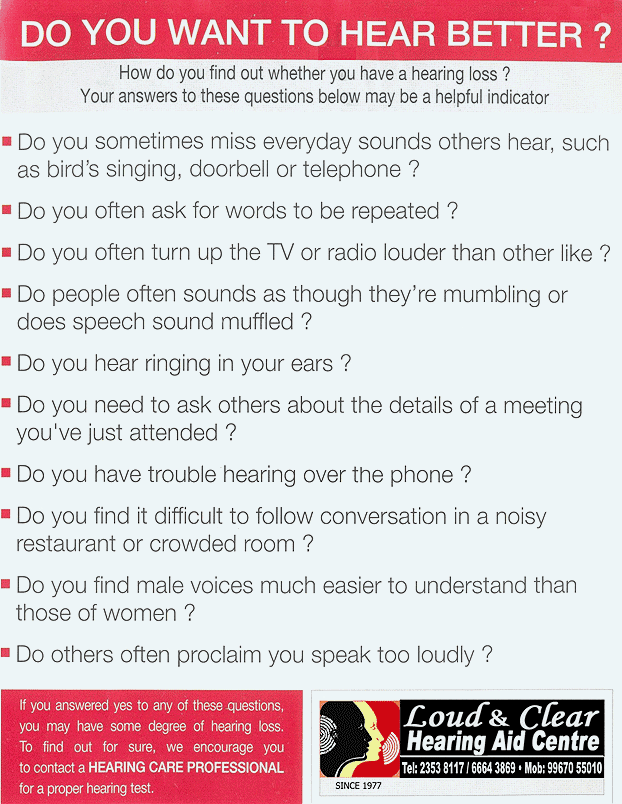
When Do You Need To See A Professional For Your Hearing Difficulties?


1) When Is The Need For A Hearing Aid?
If you are having problems in your day to day communication or your work, you need a hearing aid. Many times people themselves don’t realize the need for an aid but their family members or co-workers find it very difficult to communicate with them. Hence, if either you or people close to you feel your hearing ability is diminished, you need to get it checked.Do you here LOUD & CLEAR ?
Do you keep T. V. Volume too high ?
Do you find it difficult to converse on phone ?
Do you have to ask the other person to repeat ?
Do you “NO MORE” enjoy social gatherings & parties ?
then you need……Hearing Check
2) What Type Of Aid Should One Buy?
Depending on the type and degree of loss one has to decide the type of aid to buy. The most important factor to be considered prior to hearing aid purchase are the communication requirements of the User.3) Whether One Should Wear One Or Two Hearing Aids?
The brain is wired to receive input from both ears; Academic literature supports binaural (“two-eared”) amplification. When you are using hearing aids on both ears, (a) you need less power, (b) you get better understanding under different circumstances, especially in noise, (c) you get much better depth perception, in both the horizontal and the vertical zone, (d) you may be safer, because you will have a better idea of where warning sound are coming from, (e) you enjoy better sound quality, giving yourself better life quality. But the final decision for the same is determined on the basis of the degree, type of hearing loss and communication needs of the User.4) What Is Digital Hearing Aid?
Analogue Hearing Aid users biggest complain about the hearing is that they need to turn the volume up and down all the day long. That's why 'Digitally Programmable' hearing aids have no volume control. It doesn't need one. Instead, Digitally Programmable, automatically adjusts to changes in listening environment - strengthening of softening amplification according to his individual needs.Unlike most hearing instruments, it automatically separates incoming sounds into low-, medium-, & high -pitched channels. These sounds are amplified differently, because your hearing ability differs according to the pitch, not just loudness, of the sounds you hear. Audiologists uses a computer to preset the Digitally Programmable hearing aid so it automatically adjusts to your unique loud and soft hearing comfort needs. Because Program continually fine-tunes sound volumes, you don't have to. The result is a pleasant, comfortable listening experience - all day long, wherever you are. Programmable comes in both in-the-ear and behind -the-ear models.
5) Will A Hearing Aid Restore Normal Hearing?
No, Hearing aids do not restore hearing to normal and may not be as effective in all listening situations such as noisy backgrounds or listening to speech at a distance. It is an aid , a compensation. In more difficult listening situations, a FM system or a similar assistive device may be beneficial.6) After Fitting An Aid, Is Regular Follow-Up Necessary And How Often?
Yes, a follow up is necessary since hearing may change or fluctuate over time. It is important to detect this as early as possible to prevent further loss and to obtain medical treatment if needed. After you have been fitted with your hearing aid it is important to have your hearing re-evaluated on regular basis. Your hearing aids performance should be tested as well. These evaluations should be done annually or more often if recommended by the audiologist or doctor.7) Myths about hearing aids
There is still a great deal of misunderstanding about using hearing aids. Many people still believe:That hearing aids are big and clumsy
That they continuously whistle
That they need a remote control as big as those used for TV
That they are difficult to operate and maintain
8) Psychological Consequences of hearing loss
Some people can develop emotional or social difficulties due to their hearing loss. The inability to understand what is being said can lead to isolation, loneliness or depression. It can therefore mean a great deal if the people around them are supportive and encourage them to seek professional advice if necessary.Some people with a hearing loss struggle with a feeling of embarrassment if they misunderstand what is being said, or respond inappropriately. Your support and understanding in such cases can make a big difference. People with hearing difficulties often spend a great deal of their energy just in concentrating on listening, which can lead to tiredness and stress. So it is important that others are equally understanding, for example colleagues and management at their workplace.












